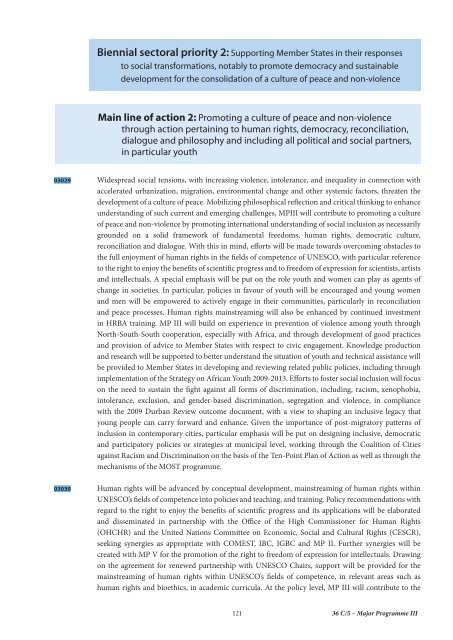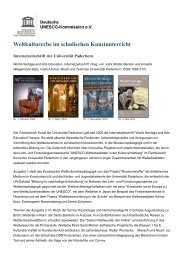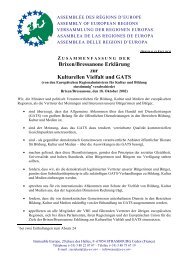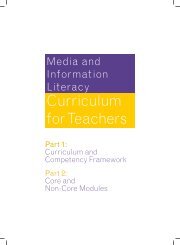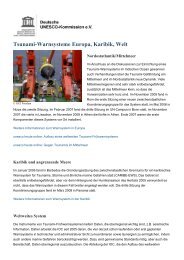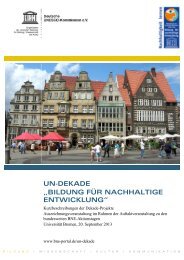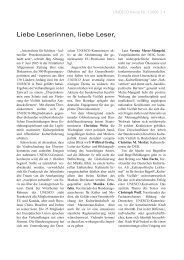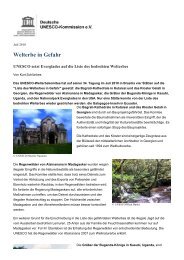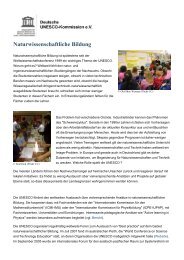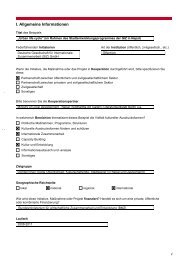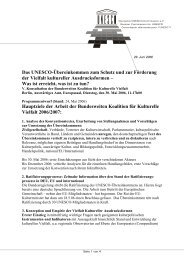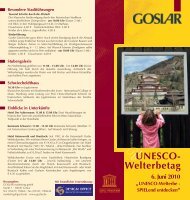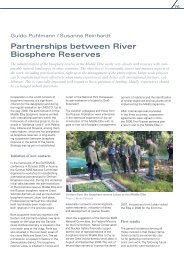UNESCO. General Conference; 36th; 36 C/5: volume 1: Draft ...
UNESCO. General Conference; 36th; 36 C/5: volume 1: Draft ...
UNESCO. General Conference; 36th; 36 C/5: volume 1: Draft ...
You also want an ePaper? Increase the reach of your titles
YUMPU automatically turns print PDFs into web optimized ePapers that Google loves.
Biennial sectoral priority 2: Supporting Member States in their responses<br />
to social transformations, notably to promote democracy and sustainable<br />
development for the consolidation of a culture of peace and non-violence<br />
Main line of action 2: Promoting a culture of peace and non-violence<br />
through action pertaining to human rights, democracy, reconciliation,<br />
dialogue and philosophy and including all political and social partners,<br />
in particular youth<br />
03029 Widespread social tensions, with increasing violence, intolerance, and inequality in connection with<br />
accelerated urbanization, migration, environmental change and other systemic factors, threaten the<br />
development of a culture of peace. Mobilizing philosophical reflection and critical thinking to enhance<br />
understanding of such current and emerging challenges, MPIII will contribute to promoting a culture<br />
of peace and non-violence by promoting international understanding of social inclusion as necessarily<br />
grounded on a solid framework of fundamental freedoms, human rights, democratic culture,<br />
reconciliation and dialogue. With this in mind, efforts will be made towards overcoming obstacles to<br />
the full enjoyment of human rights in the fields of competence of <strong>UNESCO</strong>, with particular reference<br />
to the right to enjoy the benefits of scientific progress and to freedom of expression for scientists, artists<br />
and intellectuals. A special emphasis will be put on the role youth and women can play as agents of<br />
change in societies. In particular, policies in favour of youth will be encouraged and young women<br />
and men will be empowered to actively engage in their communities, particularly in reconciliation<br />
and peace processes. Human rights mainstreaming will also be enhanced by continued investment<br />
in HRBA training. MP III will build on experience in prevention of violence among youth through<br />
North-South-South cooperation, especially with Africa, and through development of good practices<br />
and provision of advice to Member States with respect to civic engagement. Knowledge production<br />
and research will be supported to better understand the situation of youth and technical assistance will<br />
be provided to Member States in developing and reviewing related public policies, including through<br />
implementation of the Strategy on African Youth 2009-2013. Efforts to foster social inclusion will focus<br />
on the need to sustain the fight against all forms of discrimination, including, racism, xenophobia,<br />
intolerance, exclusion, and gender-based discrimination, segregation and violence, in compliance<br />
with the 2009 Durban Review outcome document, with a view to shaping an inclusive legacy that<br />
young people can carry forward and enhance. Given the importance of post-migratory patterns of<br />
inclusion in contemporary cities, particular emphasis will be put on designing inclusive, democratic<br />
and participatory policies or strategies at municipal level, working through the Coalition of Cities<br />
against Racism and Discrimination on the basis of the Ten-Point Plan of Action as well as through the<br />
mechanisms of the MOST programme.<br />
03030 Human rights will be advanced by conceptual development, mainstreaming of human rights within<br />
<strong>UNESCO</strong>’s fields of competence into policies and teaching, and training. Policy recommendations with<br />
regard to the right to enjoy the benefits of scientific progress and its applications will be elaborated<br />
and disseminated in partnership with the Office of the High Commissioner for Human Rights<br />
(OHCHR) and the United Nations Committee on Economic, Social and Cultural Rights (CESCR),<br />
seeking synergies as appropriate with COMEST, IBC, IGBC and MP II. Further synergies will be<br />
created with MP V for the promotion of the right to freedom of expression for intellectuals. Drawing<br />
on the agreement for renewed partnership with <strong>UNESCO</strong> Chairs, support will be provided for the<br />
mainstreaming of human rights within <strong>UNESCO</strong>’s fields of competence, in relevant areas such as<br />
human rights and bioethics, in academic curricula. At the policy level, MP III will contribute to the<br />
121 <strong>36</strong> C/5 – Major Programme III


